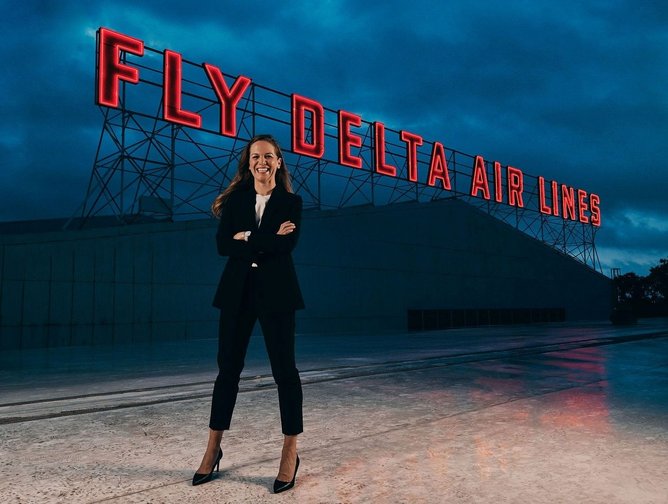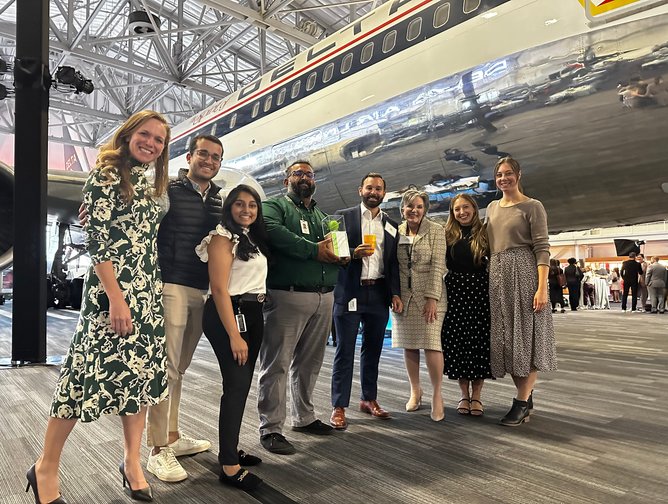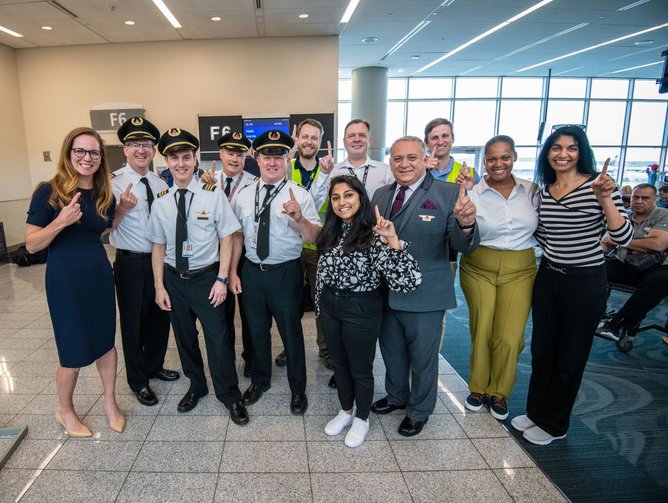Amelia DeLuca, CSO at Delta Air Lines on Female Leadership

For Amelia DeLuca, sustainability has always played a role in her personal life – from raising her children to making purchasing decisions at home, or supporting environmental initiatives.
But it took years working at Delta Air Lines before it became a career.
Appointed Chief Sustainability Officer in July 2023, following 17 years in leadership roles at Delta, DeLuca is charged with leading Delta Air Lines to Net Zero in 2050.
“For most of my career at Delta, I was an aviation pro by trade. Sustainability only came to me after working closely with one of Delta’s former sustainability leaders,” DeLuca tells Business Chief.
“From the get-go, I was hooked because sustainability is all about innovation, partnerships, data and blazing new paths without always knowing if you’ll reach the destination or need to pivot after a short layover,” says DeLuca.
DeLuca came into this role with a strong track record as a team leader and an ability to galvanise teams to solve hard problems.
“I have a background in Math, so I love data. Across Delta and within my role, we follow the data. We are committed to science-based targets and are always testing, iterating, and re-testing based on the feedback and data we receive.”
Now as the CSO in one of the most difficult-to-decarbonise sectors, DeLuca has huge optimism about the future,
Here, we talk to DeLuca about her role in driving decarbonisation at Delta, the unique characteristics of the CSO role, and how sustainability can serve as a pathway for more women leaders.

Amelia, tell us about your Delta career and specifically your role as CSO at Delta Air Lines
I have a 17-year career with Delta and have held leadership positions within the Sustainability, Global Sales, Revenue Management and Network Planning teams, based in Mexico, the US, and the Netherlands. Before becoming CSO, I served as VP, International Customer Experience and Partner Sustainability where I led cross-divisional efforts to deliver a consistent premium customer experience across Delta’s partners.
I also supported the development of Delta's partner sustainability strategy across its global partner network to accelerate the alliance’s leading sustainability position.
As CSO, I see my role as driving three major themes.
Firstly, taking action today to invest and make incremental changes to things we can control that impact our environmental footprint. Secondly, prtnering with industry stakeholders to advance policies, infrastructure and technology that will make the more sustainable future of travel possible for all airlines.
And finally, preparing our business to implement meaningful changes, from hydrogen-powered aircraft or more fuel-efficient airframes, as decarbonisation technology rapidly evolves and becomes proven.
Delta’s strong history of driving innovation is already translating to help define the more sustainable future of aviation. I’m energised by the work we’re doing today around what we fly, how we fly and the fuel we use that will fortify our business for the next 50 years and beyond.
What does it mean to be a woman leader in the aviation industry?
Aviation is an industry that historically has not had a lot of female representation, let alone in the C-suite. At Delta, that’s been changing for some time, and I’ve been fortunate to have many female leader mentors throughout my career while trying to pay it forward to others.
Every leader should find opportunities to lift women and other underrepresented groups up, give them a voice when they are not in the room and find opportunities to bring them into the room all together.
I have so much to be proud of—my team is incredible and full of so many smart, innovative and collaborative individuals who can all come together to help solve these significant challenges.
Women are advancing in sustainability at a much faster rate than other business areas. Do you see sustainability as a catalyst for increased female leadership?
For me, the role of a sustainability leader is to provide the energy and advocacy required to champion progress, even when it is difficult or inconvenient for an organisation to do so.
It means providing the rational and unrelenting voice that does not shy away from challenges or barriers — all while being able to communicate clearly so stakeholders don’t lose sight of our ultimate goals as we navigate the realities of a changing climate.
When I think about women’s business leadership more broadly, women are only going to continue to grow into more leadership positions.
We are no strangers to doing hard things, we are often great communicators and have historically been strong people leaders, especially through transitional and evolving times.
I do think that the CSO role is uniquely positioned because success doesn’t just lie with what my team does. It’s also how we communicate and partner with stakeholders, industry collaborators, investors, policymakers and more. It’s a complex web of players who all need to be engaged.
What behaviours or characteristics do women possess that help them succeed in the sustainability leadership role?
We have people on our team with a wide range of backgrounds from consulting, automotive, aerospace engineering, environmental sciences, marketing, communications and more.
Every role throughout Delta should touch sustainability, so to me, sustainability is unique in that it can attract and impact people from nearly every background.
When I think about a characteristic that makes women, or anyone in sustainability leadership roles successful – it’s the ability to prioritise and deprioritise initiatives based on the data you have.
We know that if we could do everything, we would. But that’s not always possible, so finding ways to prioritise and focus in on the levers that will make the most impact and communicate the bigger picture – these are key for helping women leaders succeed.
Another trait that’s important to have is knowing when to take a step back.
Again, decarbonisation within aviation is incredibly hard. And it’s not going to be solved by one leader, one company, one industry. That’s why it’s important to find ways to take time for yourself.
I’m a huge proponent of work-life balance for our team. I have two young kids and family is incredibly important to me; I’m also a long-distance runner. My family and exercise are two things that just help with my mental health, which makes me a better leader.

How are you seeing the CSO role develop in size and scope?
One thing I think is so interesting about sustainability is that the technology keeps changing.
What we thought was the right path to invest in five or 10 years ago might be completely different from what it is now.
That’s not to say that what was in the past was bad or not part of the future, but we as an industry are learning and growing as technology evolves.
For example, sustainable aviation fuel, or SAF, was not as well-known five years ago as it is now; and even today, when we all know that this is the best-known lever for decarbonisation, there still isn’t enough of it.
So now, a huge part of our team’s work is advocating for policy changes, investment, and production of more SAF. The CSO role will continue to change as technology changes.
More than that, for many companies, sustainability has become a business imperative in a way that it hasn’t always been in the past.
That means that C-suite members and stakeholders are caring about sustainability more and investing in it. There are countless business cases for why sustainability matters, and we’ll continue to let the business case catalyse the importance of the work.
Also, there is so much strategy and cross-functional collaboration and advocating happening with sustainability.
For example, if we want to implement a change to an onboard service offering, we can’t just make that decision in a sustainability silo. We need to work closely with the in-flight and onboard teams to ensure that operationally we have the systems in place to implement the change, buy-in from the frontline teams that are actually doing it, and more.
This level of cross-functional strategy in and of itself helps create more strategic leadership roles.

Finally, what. measures can be taken to ensure more diverse leadership?
Data shows that more diverse leadership and more diverse teams boost productivity, attract new talent, build more trust, boost profitability, create new opportunities and more.
As companies continue to invest in ESG strategies, they will continue to see the benefits of more diverse leadership teams and prioritise those leaders as part of their culture and strategy.
I am a big proponent of servant leadership.
People are what matter, so finding opportunities to provide mentorship, sponsorship, and advocacy for women and diverse voices is critical to enhance this pathway.
Give people projects, teams, and initiatives to show their value and provide mentorship along the way that leads them to success.
If you see other opportunities where they can succeed, advocate for them, especially if they aren’t in the room. That’s how I got to where I am in my career, so I am proof that this works.
- Twenty companies appointing first-ever female CEOs in 2023Leadership & Strategy
- Family business leaders on lessons learned from ESG journeysSustainability
- Hema Gokal: leading the Salesforce women's equality strategySustainability
- Top 10 must-read sustainable leadership books for CEOsSustainability






